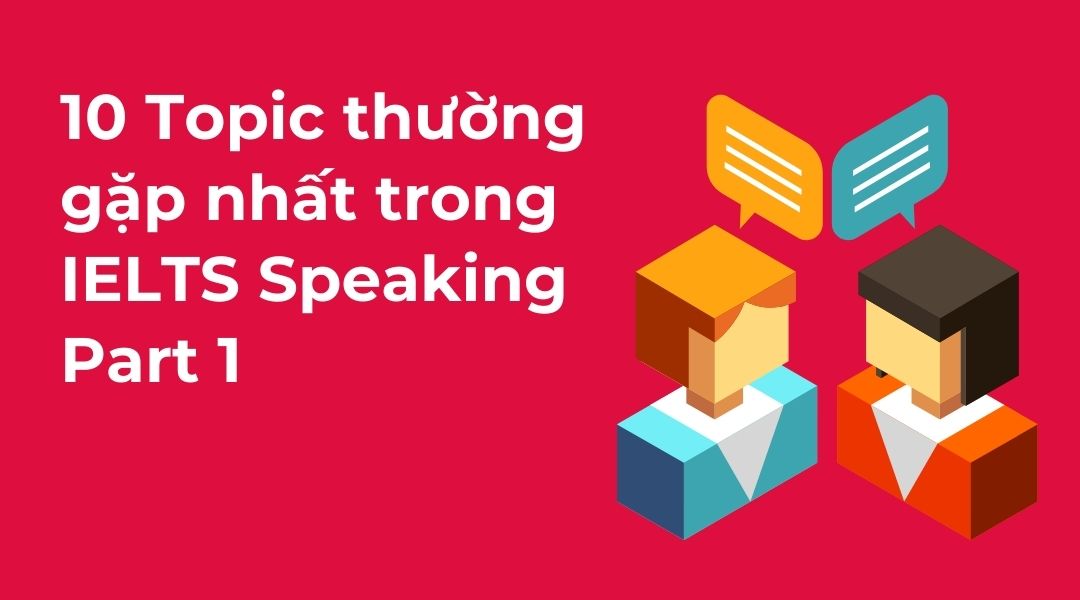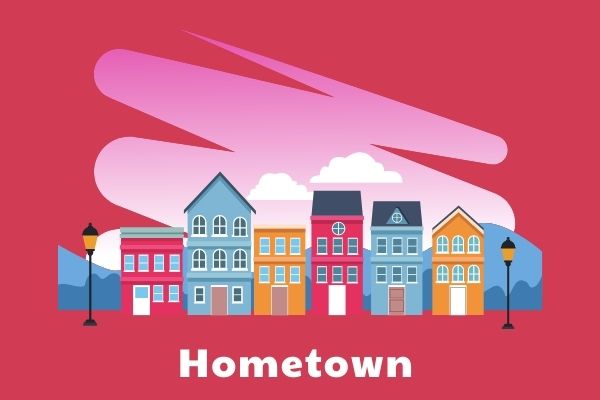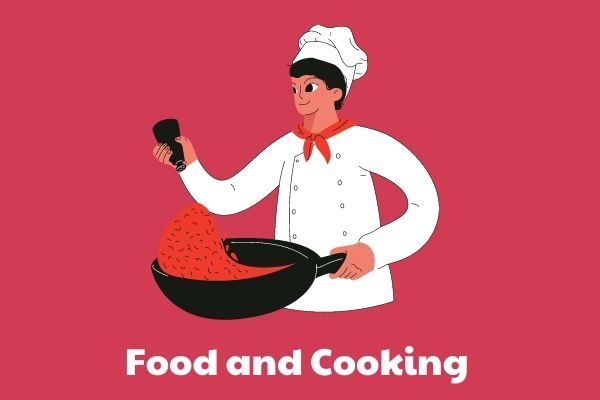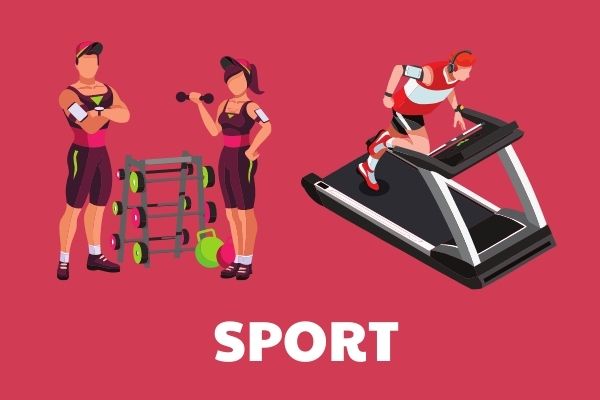


Như chúng ta đã được biết, IELTS Speaking Part 1 là phần mở đầu cho bài thi IELTS Speaking và nó cũng được đánh giá là phần thi nhẹ nhàng và có độ khó thấp nhất. Vì vậy, để hoàn thành tốt phần thi này không phải là điều quá khó khăn. Việc cần làm của bạn là hãy tham khảo thật nhiều chủ đề câu hỏi và Sample Answer để trang bị kỹ năng và đa dạng cách trả lời.
Bài viết này LangGo sẽ tổng hợp cho bạn 10 Topic thường gặp nhất trong IELTS Speaking Part 1 kèm câu hỏi và trả lời mẫu giúp các bạn tham khảo.
IELTS Speaking Part 1 là phần mở đầu cho bài thi IELTS Speaking. Phần thi này được kéo dài trong khoảng 5 - 6 phút. Trong thời gian tiến hành phần thi, giám khảo sẽ hỏi bạn khoảng 12 câu hỏi với 3 chủ đề và yêu cầu bạn trả lời.
Do thời gian khá ngắn cộng với yêu cầu của phần này là giám khảo và thí sinh có sự tương tác và thảo luận với nhau. Vậy nên, câu trả lời của phần này nên ngắn gọn, đủ ý và đúng trọng tâm.
IELTS Speaking part 1 topic thường là những chủ đề khá đơn giản và quen thuộc trong cuộc sống. Vậy, những chủ đề thường gặp sẽ là gì và chúng ta nên trả lời như thế nào để đạt được điểm cao? Những phần tiếp theo của bài viết sẽ giúp các bạn làm rõ những vấn đề này nhé.
Dưới đây là tổng hợp 10 IELTS Speaking part 1 topics & questions thông thường mà bạn có thể gặp trong bài thi. Bạn cũng có thể tham khảo cả những câu trả lời mẫu mà chúng mình cung cấp để biết phương án trả lời phù hợp.
Ngoài ra, LangGo cũng tổng hợp một vài từ vựng cần lưu ý trong từng IELTS Speaking part 1 topic dưới đây để các bạn có thể tiện tham khảo.
Question 1: Are you studying or working?
→ Answer: I’m currently a senior at X University, which is one of the top schools in the nation. Admission is incredibly competitive, so I’m very proud of being a student here.
Question 2: What are you studying?
→ Answer: Well, I’m majoring in Accountancy, so as you can guess, I deal a lot with numbers and figures day in, day out. It can be overwhelming at times, but I think that I have a knack for mathematics and calculations, so it’s okay.
Question 3: Why did you choose to study that?
→ Answer:There are many reasons for my choice. Primarily, I have an interest in Accountancy. Another reason could be because of Accountancy itself since I’ve found that my personality has changed positively. I’ve become more patient and skillful.
Question 4: What was your favorite subject at school?
→ Answer: Organizational behavior, microeconomics were my two favorite subjects so far. These two subjects have built my base and love for the whole course and I still find it fascinating.
Từ vựng cần lưu ý:
Day in, day out: Liên tục, lặp đi lặp lại qua nhiều ngày
Accountancy: Kế toán
Have a knack for: Đặc biệt thành thạo làm việc gì đó
Question 1: Do you work somewhere?
→ Answer: Yes, I am working as a Business Analyst in a large IT company. The name of this company is IT Vista and I joined there 2 years ago.
Question 2: What do you do for a living?
→ Answer: The job is my main source of income. Apart from that, I work as a part-time consultant in a Business organization and do some professional content writing as a freelancer.
Question 3: What are you doing these days?
→ Answer: You mean in my office right? In my office, I am working on requirement creation for large software and I need to report the progress every day to the team lead. Apart from that, I am writing a pdf manual for a client.
Question 4: Do you like your job?
→ Answer: Definitely, I love my job. I love the work I do and I like to be productive in my job field. In fact, my job brings me my bread and butter and I am grateful for having a nice job in a prestigious organization.
Từ vựng cần lưu ý:
Part-time consultant: Chuyên gia tư vấn bán thời gian
Freelancing career: Nghề tự do
Bread and butter: Công việc nuôi sống bản thân

Tham khảo IELTS Speaking part 1 topic Hometown cùng LangGo
Question 1: What’s the name of your hometown and where is it?
→ Answer: My hometown is on the southeast coast of Northern Ireland. It’s called Dundrum and it’s about 1 hour south of the capital city.
Question 2: Is that a big city or a small place?
→ Answer: My hometown isn’t a major city in China but it’s not small either. As far as I know, it has a population of 5 million people. So the urban area is always crowded with people. It’s also the largest city of the province by land area.
Question 3: How long have you been living there?
→ Answer: I’ve been living in my hometown since I was born. I’ve never thought about leaving my hometown because my entire social circle is there and the cost of living is pretty low. However, I also want to work in a different city for a few years to broaden my horizons.
Question 4: Do you like your hometown? If yes, what do you like (most) about your hometown?
→ Answer: Yes, I do. I’m from Harbin, which is a city in the northeast of China. It’s famous for the Ice & Snow Festival there, which is a really cool annual event in my hometown. Tons of visitors come to my city to see it every year. I love being a tour guide and showing my friends from other cities this tourist attraction.
Tham khảo thêm 2 cách chinh phục mọi câu hỏi trong IELTS Part 1 cùng Ms. Diệu Hoa nhà IELTS LangGo kết hợp IFO Musketeer Zone ngay dưới đây nhé:
Question 1: What’s the origin of your name?
→ Answer: My name is named after a famous figure who my parents really admire and they really hope that I can turn out to be exactly like her in the future. So yeah, I guess both of them agreed upon the name.
Question 2: Does your name have any special meaning?
→ Answer: Most Vietnamese names do, I suppose, and mine is not an exception. My name can be interpreted as a river in Autumn. In my country, anything related to Autumn is considered beautiful and calm, since this season is the most comfortable one out of the four. So, I assume my parents did have somewhat an expectation when they named me that.
Question 3: What do your friends call you?
→ Answer: It really depends. Most of my close friends prefer to call me by my nickname, “Pup”. Meanwhile, others just use my first name.
Question 1: What kind of accommodation do you live in?
→ Answer: I have been living in a house with my family, and I think if I can move out and start making a living on my own, I would try my best to have an independent place where I can plan and design a house layout that suits myself since sharing a room or a flat with strangers sounds troublesome to me.
Question 2: How long have you lived there?
→ Answer: Although during my childhood my family had to move a lot, I’ve lived in the most recent house for almost ten years. Compared to the old houses, I think this house has been the best so far.
Question 3: What do you usually do in your house?
→ Answer: Well, definitely I’ll spend some me-time there. I study, I chill out by reading, drawing, and dancing all by myself. Sometimes I also invite one or two friends to spend time with. We’ll watch some movies together and tell each other endless stories.
Question 4: Which part of your home do you like the most?
→ Answer: It’s the dining room where my family spends our time together. Not only lunch or dinner but all our family reunions take place in the dining room where we can enjoy a harmonious atmosphere. We always try to keep the family dinner as something we cannot go a day without since for us it’s the family bonding that lies behind it.
Từ vựng cần lưu ý:
Suit myself: Phù hợp với bản thân
Troublesome: Gây khó khăn hoặc phiền toái
Me-time: thời gian dành để ở một mình
To make a living: Kiếm đủ tiền nuôi bản thân
Question 1: Do you think patience is important?
→ Answer: Absolutely. I think it’s a quality that everybody should try to learn. In my opinion, learning to wait until the right time is the key to success. In fact, most successful entrepreneurs are very patient.
Question 2: Do you think being patient is an important part of being polite?
→ Answer: Yes, I think patience is an indicator of politeness. A polite person would never chew someone out for keeping them waiting. If there’s a good excuse for being late, a polite person would be willing to overlook such minor mistakes.
Question 3: Have you ever lost your patience?
→ Answer: Well, yeah, without a doubt, there have been times when I lost my cool. For example, there was this one time, when I had to wait forever to be seated at a popular restaurant. Then someone suddenly cut in line and that really ticked me off.
Question 4: Were you patient when you were young?
→ Answer: I don’t really know, since I don’t have many childhood memories. It’s pretty common, however, for kids to easily lose patience as they don’t know how to keep their emotions in check. There may have been times I was patient, and times I was not.
Từ vựng cần lưu ý:
Cut in line: Chen hàng (khi mọi người đang xếp hàng)
Chew someone out: Khiển trách ai đó nghiêm khắc
Overlook: Bỏ qua, phớt lờ

IELTS Speaking part 1 topics and answers
Question 1: What kinds of food do you particularly like?
→ Answer: I’d have to say Asian cuisine is my favorite. I am a huge fan of the bold flavors and spices used in Korean and Vietnamese dishes. Something I often daydream about eating is X, which is a tip-smacking noodle soup dish served with a crab broth. It’s every bit as delicious as it sounds.
Question 2: Is there any food you don’t like?
→ Answer: It’s true that there are a few things that kind of put me off. For example, I cannot stand Y, which is essentially a shrimp paste. A lot of people like it, though, but I think it smells awful. Definitely not my cup of tea.
Question 3: What kinds of food are most popular in your country?
→ Answer: I think street food is a staple around here. You can find bustling food stalls all around our nation, and they are my go-to's for a cheap and cheerful meal. I mean gourmet restaurants are nice and all, but street food is what our country is all about.
Question 4: Do you like cooking? (Why?/ Why not?)
→ Answer: Actually, I’d like to think that cooking is my forte. I developed a passion for culinary arts when I first watched the cooking show Masterchef. Since then, I have learned a lot of recipes and I can easily whip up a good dinner.
Từ vựng cần lưu ý:
Whip up: Chuẩn bị món gì đó để ăn thật nhanh
Forte: Sở trường
Bold flavor: Mùi hương nặng
Tip-smacking: Ngon, hấp dẫn
Broth: Nước dùng
Staple: Sản phẩm, mặt hàng chủ lực
Bustling: Nhộn nhịp, náo nhiệt
Gourmet restaurant: Nhà hàng cho người sành ăn
Not my cup of tea: Không phải thứ tôi quan tâm
Question 1: Do you do housework at home?
Answer: Yes, I do! Even though I could afford domestic help, I prefer to do it on my own. I live by myself in a small, studio apartment so it’s easy enough. Actually, I find housework to be relaxing. When I feel stressed, I like the mindless activity (something which doesn’t require hard thinking) of scrubbing the shower, floors, and kitchen cabinets. I really hate sweeping though! I always miss too many spots.
Question 2: What housework do you usually do?
→ Answer: All of them! I do dishes, dusting, sweeping, mopping, and scrubbing the kitchen and bathroom. I usually do a deep clean every two weeks, but keep tidying up during the week. I have a pet peeve of having a clean bathroom, so I generally do that about once a week.
Question 3: Do you like doing housework?
→ Answer: I like most chores. I’m a neat freak, and I just love seeing my entire house spic and span. The feeling of a clean home makes all that hard work super satisfying!
Question 4: Did you do housework when you were a child?
→ Answer: Yes, my parents enforced this. They had a rotation chore assignment chart for the 4 of us children every week. We would earn $5 a week for completing them. If we acted up, extra chores would be put on (assigned to) us. If we had a special accomplishment, like straight A’s, we would be off chores for a week.
Từ vựng cần lưu ý:
Pet peeve: Điều gây phiền lòng
Acted up: Cư xử không đúng
Put on: Được giao cho
Spoiled: Hư hỏng
Poor eye: Mắt kém
Question 1: Do you like traveling?
→ Answer: Not really, to be honest. I’m a creature of habit (someone who doesn’t like changes to routine), so I’m usually not keen to change my daily routine. When I do mix it up, it often makes me feel anxious and disoriented (not a clear mind). Furthermore, I have a fear or airplanes and getting carsick, so traveling just isn’t for me.
Question 2: Do you often travel by air?
→ Answer: Not at all! I try to avoid it at all costs (very seriously). If I must travel, I will take some motion sickness (getting sick from any kind of transportation) medicine and go by car or train. I was once on an airplane on my honeymoon that came very near to crashing, so my phobia (strong fear) stems from (comes from. Stem is the part where the flower grows) this.
Question 3: How long was the longest trip you took?
→ Answer: I once had to go on business to the Philippines. It was a 24 hour flight! It was a nightmare (we saw this when something is very terrible). On top of this, I was seated next to a child who was relentlessly (not stopping) crying during the entire journey.
Question 4: Which country would you like to travel to in the future?
→ Answer: I’m dying to (I really want to) go to Egypt. I’ve always dreamt of going there since I was a child, actually. I’m really fascinated by their ancient culture. I would be in awe of (amazed by) the Grand Pyramids I’m sure. Unfortunately, since I despise (hate) flying, I don’t think I’ll ever get there.
Từ vựng cần lưu ý:
Creature of habit: Người không thích thay đổi thói quen
Disoriented: Đầu óc không minh mẫn
At all costs: Rất nghiêm túc
Nightmare: Ác mộng
Galaxy: Thiên hà

Sample IELTS Speaking part 1 chủ đề Sport (Thể Thao)
Question 1: Do you play any sports?
→ Answer: Not anymore. I was an avid swimmer as a child, but I gave that up after high school, as it was quite time-consuming. Nowadays, I enjoy going to the gym, running around the lake by my house, and going on mountain treks. I’m not sure if these are considered sports, but I’m really into physical activity.
Question 2: Which is the most popular sport in your country?
→ Answer: Soccer of course! As soccer is the sport of the world, that would be number one. People go wild when our team wins a game- they even drive around waving flags, blocking off the streets! Apart from this, many people enjoy playing tennis and doing martial arts.
Question 3: Who is your favorite sports star?
→ Answer: As I’m not a big sports fan, I don’t really have one. However, I think I may like Cristiano Ronaldo. Although I don’t know anything about him or his athletic abilities, I think I’ve always been drawn to him because of his looks.
Question 4: What kinds of sports would you like to try in the future?
→ Answer: I’m really intrigued by soccer. I think it’s something that can really connect people, as well as is good cardiovascular and coordination activity. Actually, I wish I had gotten into it as a child. I think it would be interesting to join a league in my city.
Từ vựng cần lưu ý:
Despise: Khinh thường
Drawn to him:: Thu hút ai đó
Coordination: Phối hợp
Nguồn: IELTS Material, IELTS Practice Online, Reading IELTS
Như vậy, bài viết trên LangGo đây đã tổng hợp cho bạn đọc 10 IELTS Speaking part 1 topics đi kèm câu hỏi và câu trả lời mẫu. Hy vọng nó có thể trở thành một tài liệu tham khảo bổ ích cho những ai đang ôn luyện cho phần thi IELTS Speaking.



ĐẶT LỊCH TƯ VẤN MIỄN PHÍ LỘ TRÌNH Săn ƯU ĐÃI lên tới 12.000.000đ